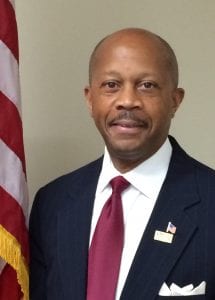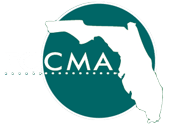 By Norton Bonaparte, City Manager, City of Sanford
By Norton Bonaparte, City Manager, City of Sanford
There is no playbook for managing a city in a pandemic. From providing services to residents directed to stay home, to coping with sick employees, to closing City Hall to the public, everything can and does happen. This year’s coronavirus pandemic has brought great challenges and an everchanging landscape to my role as city manager of Sanford, Florida. Here are some of my experiences.
Sanford is located in central Florida, just north of Orlando, with a population of 60,000 residents and a City workforce of 540 employees. Our fiscal year 2020 budget totals $190 million. It was March 12 when we issued a press release informing our residents that the City was taking the threat of the coronavirus very seriously and monitoring the rapidly evolving situation. On the afternoon of Sunday, March 15, I emailed the mayor and City commissioners, informing them that I had kept abreast of communications from federal, state, county and municipal officials throughout the weekend and that I would hold a special staff meeting the next day to assess the situation for our organization.
Following the staff meeting, I declared a state of local emergency that enabled me to take action, if I felt it necessary, to address emergency situations as a result of the pandemic and respond to day-to-day exigencies. The declaration authorized me to waive purchasing policies, enact curfews and establish emergency shelters, to name a few. We issued a press release cancelling all special events scheduled through April 30—a date we later
would extend—stopping consideration of future event applications. All programs, activities, leagues and classes were suspended as of March 17 until further notice; all scheduled City facilities rentals were canceled, too.
On March 18, I sent the first of many emails to employees, assuring them we were monitoring communications at every level of government and would adjust our operations, as appropriate. We would work to minimize face-to-face interactions to combat COVID-19, while continuing our governmental operations. The next day, the City created a COVID-19 web page on its website, dedicated to such information as public meetings, programs, events, online access for utilities and permitting services.
Our human resources department provided masks and personal bottles of hand sanitizer to our employees. The human resources director sent regular emails keeping staff informed of the various aspects of the coronavirus. Our IT department provided laptops to connect them remotely to the City server as they worked from home.
We knew there would be an impact on City finances. On March 18, I enacted a ban on purchases of non-essential expenditures; effective that date, only essential, operations-necessary purchases would be allowed. Later, the finance director reported anticipating an 85 percent reduction in sales tax revenues, totaling $1.182 million. Assuming facilities remained closed, an additional $433,513 loss was possible. With departments purchasing only the essential items, we would save $594,000, leaving a fiscal year loss of $1.022 million. As it turned out, we were able to take this loss from the City’s reserves; at this time, we will not have to cut employees’ hours.
On March 19, I informed employees that the fire department would decontaminate City Hall and other City facilities. Yet given the growing nature of the pandemic, we closed the building to the public on March 23. That said, it continued to be operational and staff were expected to report absent an approved change to their work schedule.
I began weekly virtual meetings with directors to share information about their departments’ status during the crisis and ensure we were working together. An employee committee was established to prepare a manual to guide the reopening of City Hall. It developed a two-phase plan: The first phase would outline procedures for employees, with a focus on a safe workplace in compliance with public health standards; the second pertained to reopening to the public, including physical changes necessary to conduct the people’s business.
We reopened City Hall on June 1 after fitting it with plexiglass and placing decals on the floor to remind everyone to maintain social distancing. We began requiring employees and visitors to wear masks, too. As was inevitable, an employee in our utilities customer service office tested positive. She had been in close proximity with her coworkers, so we closed the office to the public for two weeks while the staff stayed home; we reminded customers of alternate options to pay their utility bills. To avoid future cases elsewhere, some department directors divided their staff into two groups and alternated them between in-person and telework modes.
To assist local restaurants, I issued an emergency declaration temporarily allowing them to place additional outside signage indicating they were open for carryout and/or delivery service; we also provided one public parking space for curbside pickup. Later, when restaurants were permitted to have in-dining service at 25 percent capacity, I issued an emergency declaration allowing them to use city sidewalks to extend outdoor eating areas.
Finally, the City established two grant programs for local businesses, with a $15,000 limit per business. The first is designed to assist with equipment purchases, such as plexiglass, to make their premises safer. The second is to assist with rehiring staff who lost their jobs due to closures.
We are adjusting to a new way of operating—Zoom meetings are now very common—against the backdrop of COVID-19 and its significant impacts. We know that will continue to be the case for the foreseeable future.
Norton Bonaparte has served as city manager of Sanford since September 2011. As the City’s chief administrative officer, he is responsible for overseeing all City operations, including a $174 million budget and more than 540 employees. He previously served as city manager of Topeka, Kansas; Plainfield, New Jersey; Camden, New Jersey; Willingboro, New Jersey; and Glenarden, Maryland. Bonaparte holds the Credentialed Manager designation from the International City/County Management Association, serves as vice chair of the board of directors of the National Academy of Public Administration and is a board member of the Florida Tri-County League of Cities. A former ASPA staff member, he holds a BS from Worcester Polytechnic Institute and an MPA from Cornell University’s Graduate School of Business; he is a graduate of Harvard University’s Senior Executives in State and Local Government Program. Bonaparte can be reached at Norton.bonaparte@sanfordfl.gov.
Reprinted with permission from ASPA PA Times, Fall 2020, Volume 6, Issue 2.






